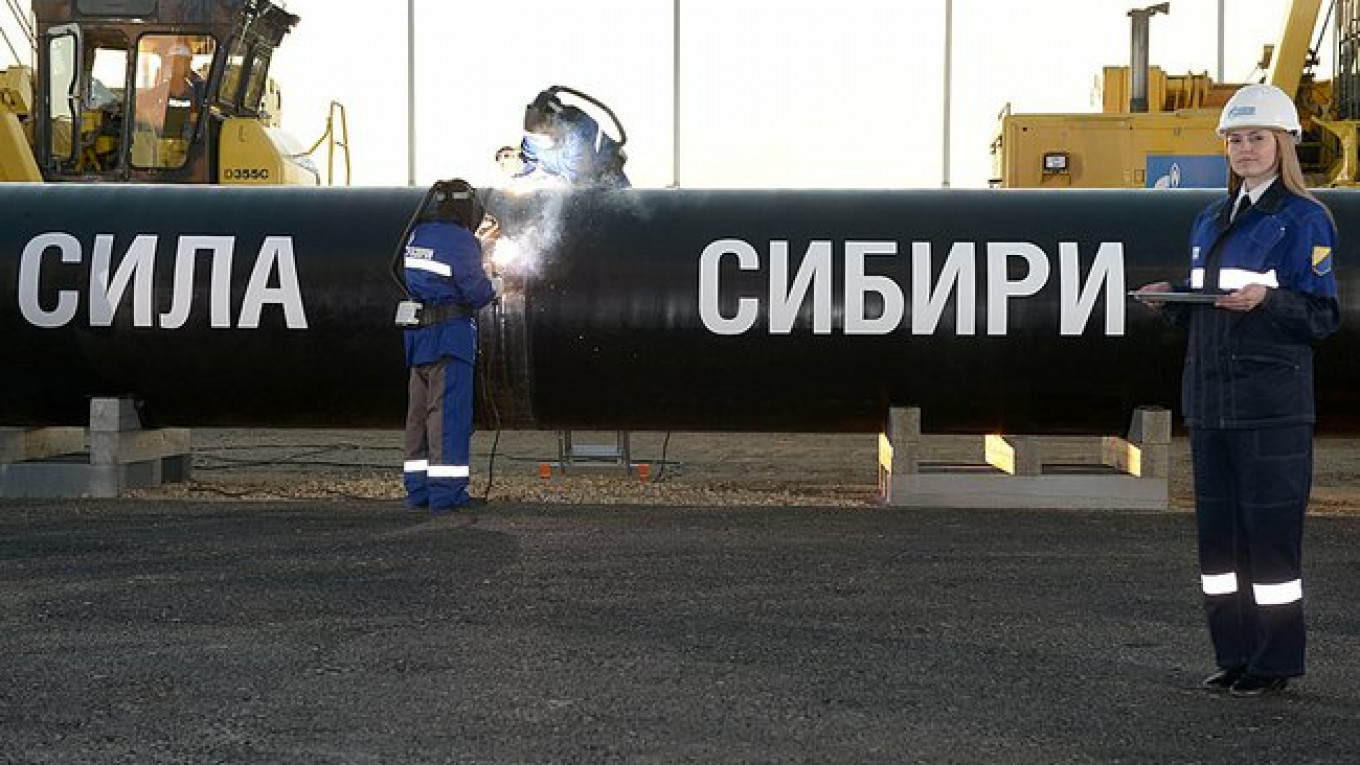US KHATYN, republic of Sakha — President Vladimir Putin on Monday oversaw the start of construction on a giant pipeline that is due to ship $400 billion worth of Russian gas to China in the three decades after flows begin in 2019.
The 4,000 kilometer Power of Siberia pipeline, being built by state-controlled Gazprom, forms a key part of the Kremlin's energy strategy, symbolizing Russia's attempts to wean itself off dependence on European markets that account for most of its exports.
"Just now, we along with our Chinese friends are starting the biggest construction project in the world," Putin told a Chinese delegation, headed by Vice Premier Zhang Gaoli, and a group of Gazprom workers in Russia's far east.
He said the first gas pipeline between Russia and China: "Will not only allow us to export gas, but to develop gas infrastructure in our country, to speed up [economic] development, not only in this region, but in the whole country."
Putin also told Zhang that he welcomed the idea of Chinese investors joining the Vankor oil project in east Siberia, owned by Russia's Rosneft.
Flows through the Power of Siberia will start at 5 billion cubic meters, or bcm, of gas in 2019, ramping up to 38 bcm under a deal signed by the two countries in May.
The long-awaited deal with China National Petroleum Corp, or CNPC, was a diplomatic coup for the Kremlin after a decade of difficult negotiations, and a symbol of its efforts to strengthen economic ties with Asia as Russia's economy faces the effects of Western sanctions over the crisis in Ukraine.
Gazprom chief Alexei Miller told Putin and Zhang that a further contract on the shipment of gas via a second, more westerly route, could be signed in November. He did not give details, however.
On Putin's command, two workers lowered their protective visors and welded the first segment of the black pipeline with flaring blowtorches. The Kremlin leader then signed his name on it.
Diversifying Exports
With a total capacity of 61 bcm per year, the new pipeline should deliver gas both to China and to remote regions in Russia's Far East.
Gazprom said on Saturday it planned to launch its far eastern Chayanda gas field at the end of 2018, aiming to ship the first gas to China in 2019. Chayanda is one of the keys to supplying China and will produce up to 25 bcm a year at its peak.
Gazprom is one of a handful of major Russian state companies not directly affected by Western sanctions. It accounts for around a third of Europe's gas needs, shipping 161.5 bcm to the region last year.
The company is at the centre of a separate row with Ukraine — a transit country for Russian gas — over gas prices. The disagreement is threatening stable gas supplies to Europe this winter, forcing Europe to step up its search for alternatives to Russian energy supplies.
Apart from Chayanda, Gazprom plans to link another huge Siberian deposit, Kovykta, with the planned pipeline. This would extend the country's gas pipeline system from west to east, enabling Russia to switch volumes depending on needs.
"After we create a gas pipeline network here, in the Far East [and] Siberia, we'll have the ability to join the European part of the gas pipeline system with the eastern," Putin was quoted as saying by Interfax.
"It will give big opportunities to send [gas] flows depending on the situation on the global markets."
A Gazprom official told reporters that at this stage the company would not connect Kovykta to the system. It planned to start pipeline construction from Kovykta in 2019.
Excluding Kovykta, the pipeline's construction along with developing Chayanda would cost around 770 billion rubles ($21 billion), said Anatoly Titov, head of the Gazprom Transgaz Tomsk unit.
Russia plans to invest $55 billion in exploration and pipeline construction to China's border, while China's CNPC has said it will build the Chinese section of the pipeline.
A Message from The Moscow Times:
Dear readers,
We are facing unprecedented challenges. Russia's Prosecutor General's Office has designated The Moscow Times as an "undesirable" organization, criminalizing our work and putting our staff at risk of prosecution. This follows our earlier unjust labeling as a "foreign agent."
These actions are direct attempts to silence independent journalism in Russia. The authorities claim our work "discredits the decisions of the Russian leadership." We see things differently: we strive to provide accurate, unbiased reporting on Russia.
We, the journalists of The Moscow Times, refuse to be silenced. But to continue our work, we need your help.
Your support, no matter how small, makes a world of difference. If you can, please support us monthly starting from just $2. It's quick to set up, and every contribution makes a significant impact.
By supporting The Moscow Times, you're defending open, independent journalism in the face of repression. Thank you for standing with us.
Remind me later.






